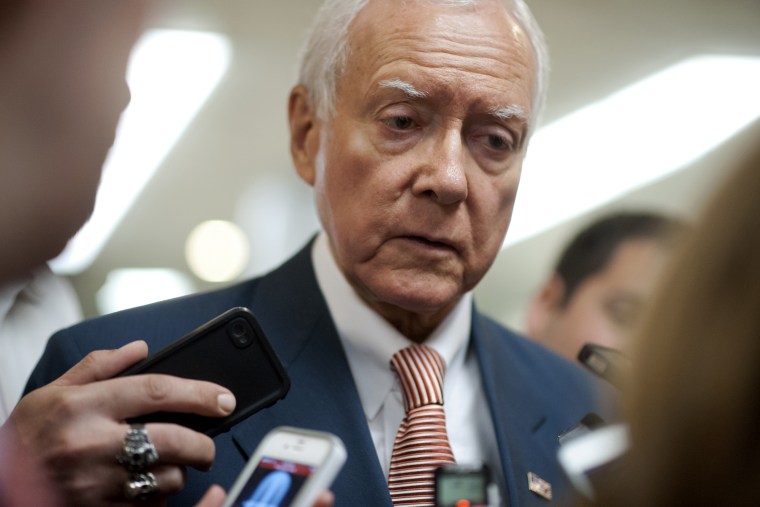The New York state attorney general's office recently accused dietary-supplement retailers of putting deeply flawed products on shelves for consumers. According to the state investigation, some "herbal supplements" made fraudulent claims, while some others included potentially dangerous unlisted ingredients.
The
New York Times reports today, however, that the largest retailer in the industry is taking steps to address safety concerns.
GNC, the country's largest specialty retailer of dietary supplements, has agreed to institute sweeping new testing procedures on its herbal products that far exceed quality controls mandated under federal law. [...] Experts said the announcement marked an initial but significant step forward for the $33 billion-a-year supplement industry, which is loosely regulated and plagued by accusations of adulteration and mislabeling.
GNC will reportedly begin an 18-month process subjecting its products to "additional quality-control measures," which will include "advanced DNA testing to authenticate all of the plants that are used in its store-brand herbal supplements."
The retailer's progress will be worth watching, but it's worth pausing to consider some more fundamental questions, such as why it was a state investigation, and not a federal one, that sparked the recent controversy. For that matter, why is it that GNC's announcement is the result of voluntary actions, as opposed to required safeguards imposed by regulatory agencies?
That's where the story takes an interesting, and more political, turn -- and attention turns to Sen. Orrin Hatch (R-Utah), who has long shown a great interest in the subject.
The NYT piece explained, "Under a 1994 federal law, supplements must carry on their labels the names and amount of every ingredient they contain. But the law, which was drafted by senators with strong ties to the industry, and which consumer advocates say is badly in need of reform, allows companies to essentially operate on the honor code."
In this case, "honor code" effectively means "voluntary." And "senators with strong ties to the industry" refers to Sen. Orrin Hatch (R-Utah), the Senate's top recipient of contributions from the multi-billion-dollar industry, who took the lead in writing the 1994 law called the "Dietary Supplement Health and Education Act" (or DSHEA).
Back in 2001, Stephanie Mencimer
wrote a piece for the
Washington Monthly highlighting some of the more serious concerns surrounding the law Hatch championed.
Since DSHEA became law, substances as varied as paint stripper, bat s***, toad venom, and lamb placenta have all been imported from overseas, bottled up -- often by people with no scientific or health backgrounds -- and marketed as dietary supplements to unsuspecting American consumers. Many supplements have been tainted with salmonella, arsenic, lead, pesticides, unapproved foreign prescription drugs, as well as garden-variety carcinogens. And despite their New-Age health aura, a significant portion of these "natural supplements" are stimulants, depressants, and other mood-enhancers that some medical experts believe would be classified as drugs if they were synthetic. A surprising number of these products are addictive. Thanks to Hatch, the U.S. now has standards as low as those in many Third World countries for the sale of many products with serious, pharmacological effects. The results have been deadly.
If this sounds vaguely familiar, it may be because John Oliver did
a pretty amazing segment on this last summer in which he argued, persuasively, that "dietary supplements in the U.S. are shockingly unregulated."
There are two agencies who theoretically oversee things, the FTC and the FDA. The FTC is supposed to regulate the marketing of supplements, but by their own admission, they give great deference to the FDA on whether a company's health claim can be supported. The problem with that is the FDA has little authority to investigate the contents of supplements until people are already getting sick from them. That sounds crazy and in the past they actually tried to change this.
And that's when the industry's p.r. campaign got to work, launching a
massive campaign to derail new public safeguards. Consumers were told that their dietary supplements were at risk, and it was up to Americans to stop Congress from putting new regulations in place. Science and medical writer Dan Hurley
noted, "More people wrote to Congress about the supplement bill than wrote about the Vietnam War."
Oliver's report added, "[I]f you are a supplement company today, you do not need approval from the FDA before a product is marketed, you can make health claims without prior approval from the government, and you don't have to prove the safety or effectiveness of your product before putting it up for sale. The industry is essentially supposed to police itself."
What's more, the
New York Times published
a report a couple of years ago pointing to research that found "Of 44 herbal supplements tested, one-third showed outright substitution, meaning there was no trace of the plant advertised on the bottle -- only another plant in its place."
And in the New York state investigation, the state A.G.'s office tested "78 bottles of popular, store-brand herbal supplements that it purchased at a dozen Walmart, Target, Walgreens and GNC locations" across the state.
Investigators found "that four out of five bottles contained no detectable genetic material from the plants advertised on their labels."
GNC now says it's choosing to take new steps to ensure quality control, but again, these steps are voluntary, we don't know what GNC competitors will do, and the entire industry will continue to operate under lax regulations.
David Schardt, a senior nutritionist at the Center for Science in the Public Interest, told the Times the GNC announcement represents "important progress," but what consumers desperately need is congressional action that would allow the Food and Drug Administration to promptly oust from the marketplace products that are dishonestly marketed or potentially dangerous."
What do you say, Orrin Hatch?
